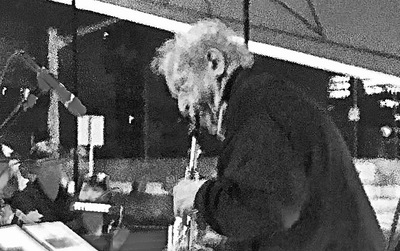For contrast, it's nice for an avant-garde musician to have something reliable and ordinary about him. In the case of the influential Chicago saxist Anthony Braxton, the comfort comes from his baggy black cardigan, his Einsteinian hair and his academic demeanor. After you absorb those trademark visuals, his sound surprises you all the more. Supporting the Broad's "Soul of a Nation" black-power art retrospective, Braxton surprised us with an added element, harpist Jacqueline Kerrod.
Maybe he likes her because she makes him surprise himself. During the first part of their set, Braxton forsook the jagged lines and halting rhythms we're used to hearing, and followed her lead in melodious cycles of alto, soprano and sopranino sax, his liquid improvisations intertwining with her delicate arpeggios in a way that felt emotional, even romantic. He's known for his abstract, mathematical composing method, and has often titled his works with diagrams rather than words. On this night, both Braxton and Kerrod referred to sheet music, but the sheets featured not only notes on staffs but colored blobs, similar to a cartoonist's bubbles wherein they could write their own dialogue. He was unquestionably jamming; even the author could not have transcribed the kind of lightning runs and jaw-generated squeals that were coming out of his horns.
Perspiration trickling down his temples from the outset, Braxton displayed enormous focus and intensity, while Kerrod plucked with a certain dreamlike possession, occasionally augmenting her sound with rich electronic tweaks. Their interplay became harsher, more staccato and more discrete as the performance progressed, until we felt ourselves back in the 1970 moment when new frontiers, more than human feelings, absorbed many of the young artists who followed Braxton's trails. And so we heard a broad map of experience, appropriate to the exhibit's scope. Exhilarating.
Before the duo, I refreshed last month's impressions with a second walk through "Soul of a Nation," and saw much more than the first time. I felt as if I were falling into the deep textures of Frank Bowling, Jack Whitten and Howardena Pindell, and Bettye Saar's tribal icons felt like a stab to the chest. Go if you can.
PHOTO BY FUZZY BROD.
Read my review of Roscoe Mitchell supporting "Soul of a Nation" here.

